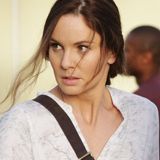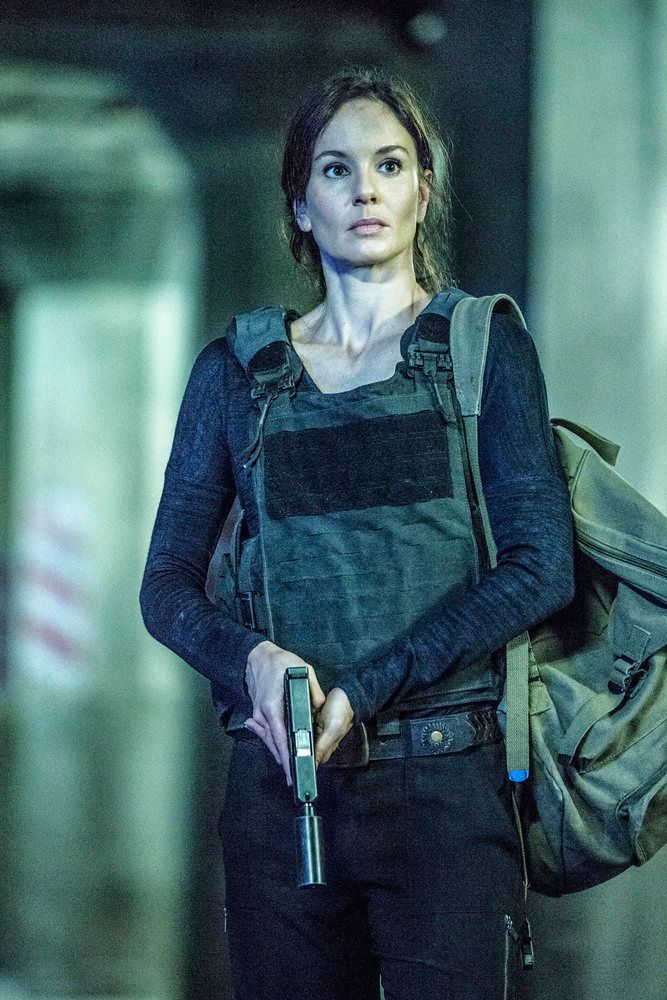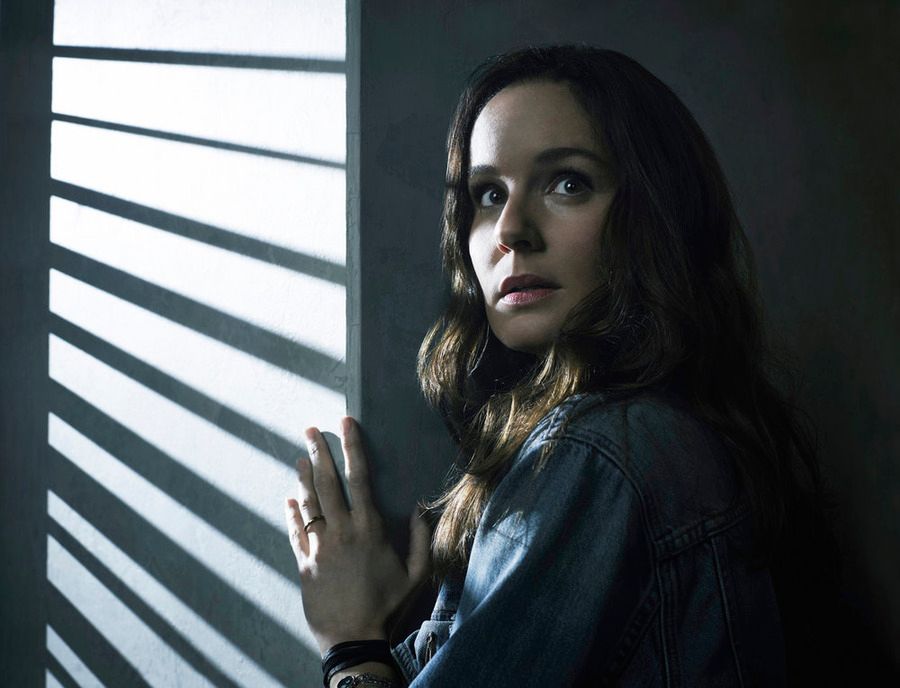Sarah Wayne Callies has been thrust into some rather extreme situations in her career. As Dr. Sara Tancredi on "Prison Break," Callies was frequently on the run or tortured for secrets. She navigated the zombie plague in "The Walking Dead," but perished while giving birth. Lately, instead of taking a break from that type of a pace, Callies stars in the USA Network's intense "Colony."
The sci-fi drama takes place in a Los Angeles that's been invaded by aliens, dividing the city into sections. Former FBI Agent Will Bowman (Josh Holloway) and his wife, Katie (Callies), take drastic measures in order to ensure the safety of their family. Will gets recruited by the invaders' human task force, the Redhats, to hunt down the Resistance. Unbeknownst to her husband, Katie is a member of those freedom fighters, and has been leaking vital information to them.
Ahead of tonight's season finale -- "Colony" has already been renewed for a second season on USA -- "Gateway," Callies spoke to SPINOFF about Katie's motivations, her evolution into a leader and how the Resistance's recent big gamble backfires. In addition, Callies talked about returning to "Prison Break" for Fox's upcoming revival miniseries.
SPINOFF Online: Despite the sci-fi backdrop, "Colony" turned out to be anything but an alien invasion saga. When you originally read the script, what were some of the elements and themes you gravitated towards?
Sarah Wayne Callies: I loved that it was the story about the genesis of rebellion. It's a story about how hard a government steps on the necks of its people before the people stand up. That appealed to the rebel in me. I thought Katie and Will's profound love of one another and the radically different philosophical approaches to the Occupation was fascinating.
From "Prison Break's" Sara to "The Walking Dead's" Lori, you've often portrayed these tough and vulnerable women. How did Katie fit that bill?
All the characters I've played have felt incredibly different to me. I'm not looking to fit a bill. If I'm looking to do anything, it's to move away from whatever it is I've just done. Sara was such a beloved character that I was looking for someone who would be contentious and controversial. When I was looking for my next job, I found that with Lori. It was so important to me not to get addicted to an audience liking my character. When that happens, you stop being an actor and start being a panderer.
When it came to Katie, I was looking for someone with a lot of femininity. Lori was a books and jeans kind of girl. I think Katie wears dresses partially because she understands that femininity is a tool of war. She's a woman who has run a bar. You learn a lot about femininity and sexuality and articulation of power in those kind of circumstances. That's where they all stand in my mind.
Intense pressure-cooker situations bring out the best and worst in people. In what ways does adding children into the equation affect or cloud people's judgments?
For the parents, adding children into an equation raises the stakes massively. For most of us who have children, there's nothing more important in our lives. In Katie's case, I think she would have probably have joined the Resistance much sooner if it wasn't for fear of her children's safety. And, yet, I feel they are the reason she ultimately becomes involved in the Resistance. She realizes it's not enough to keep them breathing. They have to be free. It becomes increasingly unbearable, this idea that her children would be brainwashed and have their lives completely regulated. She's fighting largely for this intellectual, creative and spiritual freedom.
There were times when Katie appeared horrified with the Resistance's actions. In your opinion, was Katie more invested in the cause than the men leading the charge?
The journey of the first season is Katie coming to reconcile her ideals with the actions of the Resistance. There's a book Jean-Paul Sartre wrote, called "Dirty Hands," about the ways in which people with high-minded ideals often have to make pretty profound moral compromises in the name of those ideals. I don't think Katie quite realized what she was getting into and it never really occurred to her how compromised the leadership of the Resistance could be. I don't think she ever wanted to be a leader in the Resistance. She only ever wanted to be a soldier. "Point me in a direction. Use me. Allow me to be a tool to help end the Occupation."
What she finds is that the people who are leading her cell of the Resistance -- maybe they shouldn't be fully trusted and are maybe doing things she objects to. By the end of the first season, what we see is she's starting to use her own voice in more of a leadership capacity because she feels there is no other way.
In last week's episode, "Zero Day," Katie and Will finally have it out with each other. What did that mean in terms of their relationship and how emotionally taxing was it going to that place take after take?
In terms of what it means for their relationship, it's the earthquake along the fault line. Nothing will ever be the same afterwards. While it may have released a bunch of pressure, it also destroyed a few things that Katie and Will have to rebuild.
It was one of the most difficult scenes I've ever shot, actually. And it was not just the shooting of it, which was exhausting, but we spent weeks working on that script. It became a really affirming, wonderful experience in that everyone was so respectful of each other's voice and opinions. I came away from that scene feeling a little like I had just been through a war, but also that we had earned a trust with one another, that we could then take into the second season and do even more interesting, creative, dangerous work. We had earned it together. It was just terrific.
In the same episode, Broussard [Tory Kittles] and Katie are practicing how to fire a gun. He warns her that there's no turning back after they ambush this mysterious VIP. Was that ever really an option for Katie, or had she reached that point of no return long before?
In a way, Broussard had to warn her for his own conscience. In Katie's mind, I don't think it was ever likely she was going to hear that and go, "Yeah, you're right. I'm out." It speaks to the fact that Broussard and Katie have come to care about one another, not just as comrades, but as friends. I think Broussard, in that moment, is trying to be a mentor. In a way, he's almost taken responsibility. That moment filled something between the two of them. They are very different people, but bridges were built between them.
Showrunners often keep things close to the vest and don't spell everything out. What were your thoughts on the season finale and what it meant for the second season?
From my understanding, Carlton [Cuse] and Ryan [Condal] have mapped out quite a lot of the show. When we were talking during the pilot, I was told that they had three seasons -- not that they were fully written -- but that they knew where we were going and the broad strokes of how we would get there. That's reassuring to me, as I'm sure it is to fans as well, knowing the approach is methodical and thought out because it's sure a complicated world. You want to know there is a captain steering the ship in a really important direction.
I remember reading the season finale and thinking we'd only just started to scratch the surface of the places this could go. Katie doesn't even fully emerge as a leader -- she doesn't even partially emerge as a leader -- until the very end. The finale changes everything. The nature of the Occupation will be different because there will be new leadership. And Will is gone and Katie doesn't even know he's left.
When I think about the second season, it feels like the birth of a whole new show in a way. Everyone is in a completely different place than they were when we initially started. Madeline [Amanda Righetti] has a tremendous amount of power now. I thought it was brilliant, but it also broke my heart that a show that starts with this family sitting around all together at breakfast, with the exception of a missing son, is now completely scattered to the wind with no clear path back to each other.
There are repercussions for the Resistance kidnapping a VIP. Does Katie feel guilty at all and how does that influence her decisions?
Oh, sure, Katie feels an enormous responsibility for what's happened. They would never have undertaken the operation if they had known who was on that train. It's a huge burden, which is why it forces Katie to take the actions she does in the episode. If you look at the history of resistance movements, it's fascinating to see how disproportionate response affects the population.
During the French resistance, during the Nazi occupation of Paris, as the Resistance was forming, a lot of people were very against it. They thought it was going to make things too dangerous. The Resistance targeted a few German soldiers. They killed a handful of German soldiers. The German response was to kill 50 to 100 French prisoners for every German soldier killed. The Resistance was concerned that would turn the population even further against them, but it had exactly the opposite effect. According to what I've read, what happened was, the majority of the French were so horrified, and started supporting the Resistance.
As we get into Colony's second season, it will be interesting to see whether the vastly disproportionate response to the kidnapping of the VIP is something that galvanizes the human population on the side of the Resistance or whether it's something that alienates the Resistance from most of the people in the Colony even further.
It was recently announced that you would be reprising your role as Dr. Sara Tancredi for Fox's upcoming "Prison Break" miniseries. How excited are you to be part of the revival, and what are you looking forward to?
It's an incredible thing that's happening and certainly one I never anticipated. This is now the second time I've been brought back to this show having thought it was all over. It's remarkable to me. It feels like a lifetime ago that I shot that show. I have changed so much as a person that returning to the character is going to be an extraordinary journey, because she's been through a lot, too.
It does pick up years later after the last episode aired. For me, this has been an archival process. I just finished watching Season 1 again. I'm going to get back in and finish the rest of the seasons and go over my notes from back then. It's almost like going back in time and talking to bits of yourself from the past. It's intimidating, but it's also incredibly exciting to see what we can do. I don’t usually watch much of what I'm in, so I'm watching parts of Season 1 for the first time. It was a fantastic season of television. It was just wonderful. If we can come back together and do something that intelligent and that nuanced and unique -- there weren't many people telling stories like that back then. That was 10 years ago. That was the very front edge of serialized television. If we can go back and do something that good again, what an amazing journey it will be.
The season finale of "Colony" airs at 10 tonight (Thursday, March 17) on USA.



